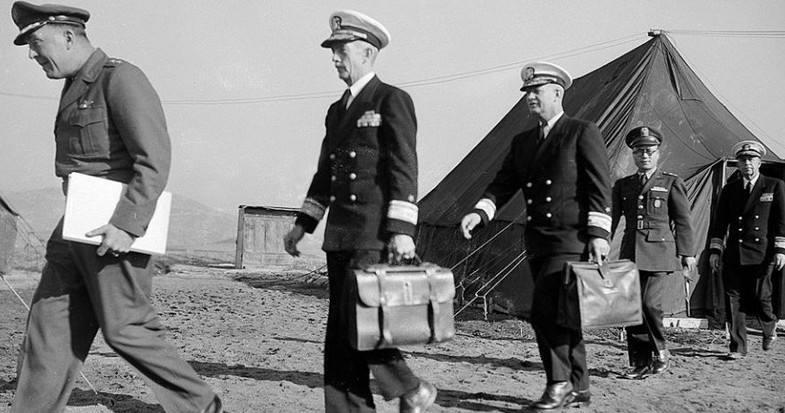The War to Resist US Aggression and Aid Korea entered into July 1951, and the DPRK, China, the United States, and the ROK began armistice negotiations.
The dprk and Chinese deputies were Nan Ri, chief of staff of the DPRK People's Army, Li Xiangchao, deputy chief of general staff of the DPRK People's Army, Deng Hua, deputy commander of the Volunteer Army, Xie Fang, chief of staff of the Volunteer Army, and Zhang Pingshan, chief of staff of the First Corps of the DPRK People's Army.
The representatives of the US and ROK sides are Turner Joy, commander of the US Far East Army Navy, Krech, deputy commander of the US Far East Air Force, Hodge, deputy chief of staff of the US 8th Army, Bork, commander of the American Cruiser Detachment, and Bai Sunye, chief of staff of the ROK Army.

The armistice talks began on 10 July and by 10 August the 19th meeting had been held. The focus of the negotiations is on the armistice dividing line, according to the requirements of the United States and South Korea, the Chinese and North Korean forces must retreat 38 to 68 kilometers from their current positions, so that the United States and South Korean troops can obtain 12,000 square kilometers of land without a single shot. The Chinese and DPRK sides insisted on using the "38th Line" as the military demarcation line, and after our side stated its reasons, the US representative actually sat at the negotiating table without saying a word, for two hours and twelve minutes.
They just sat there smoking and fighting dumb battles.
The so-called negotiation is to sit at the negotiating table and talk, everyone bargains, back and forth with language, and finally reach a consensus and form an agreement. At the negotiating table, without saying a word, pretending to be dumb, it is considered a negotiation of which door.
This performance of the representatives of the United States and the ROK made General Deng Hua, who had never experienced negotiations, very angry, and said: Since they cannot pry their mouths on the negotiating table, let them go to the battlefield, pry open their mouths with victory, and let them speak!
Therefore, after that, it entered the stage of fighting and talking, talking about fighting.
In April 1952, commander Peng Dehuai of the Volunteer Army returned to China due to illness, and Deng Hua acted as commander and political commissar. In response to the armistice negotiations that were still deadlocked, Deng Hua decided to attack first, starting on September 18, 1952, the Volunteer Army and the People's Army launched a tactical counter-offensive on the entire front, and by October 31, they had attacked 60 targets, occupied and consolidated 17 positions, and annihilated more than 27,000 enemy troops. One of the famous Battles of Shangganling also took place during this period.
The situation was basically, as soon as they were beaten, they began to negotiate, and when they did not fight, they shut up again, in the saying, it was really a crime!
In this way, the days soon passed to 1953, but the armistice negotiations still had no final result.
On June 18, 1953, after reaching an agreement on the repatriation of prisoners of war, the South Korean side expelled 27,000 prisoners of war from prisoner-of-war camps without being stopped by U.S. guards. In response to this provocative act of the ROK side, Deng Hua decided to strike a blow to the US and ROK sides and give the DPRK side more space.
General Deng Hua chose a 250-square-kilometer area south of Jincheng, from Jinhua in the west to the North Han River in the east, to occupy it. At 21:00 on July 13, the battle began, more than a thousand artillery pieces, two Katyusha rocket artillery divisions were fired in unison, and 5 armies simultaneously launched a strong attack from the front, broke through the whole line in 1 hour, and advanced 15 kilometers south in 3 days, after which they continuously repelled the US and ROK counterattacks. By July 27, more than 53,000 enemy troops had been annihilated.
On this very day, at 10:00 a.m., the DPRK, China, and the United States finally signed the "Korean Armistice Agreement" at Panmunjom, and from that day on the two sides formally ceased fire.
Further reading:
He was the richest man in the village, unwilling to be an official, but wanted a revolution, and later his son was a founding general
Who were the main leaders of the Volunteer 42nd Army? What ranks were awarded in 1955?